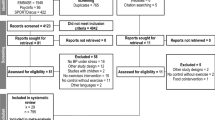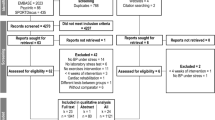Abstract
Although enhanced cardiovascular reactivity is extensively discussed as a relevant negative factor in the alteration of vascular structure, only a few controlled studies have been published presenting approaches to alter reactivity. Therefore, we examined whether enhanced reactivity could be reduced by stress management training (SMT). To control for expectation effects, progressive muscular relaxation (PMR) was the control condition. Forty-four patients with a blood pressure response greater than 15 mm Hg to a mental stress test participated in this study. Participants who took part in SMT showed a significantly stronger reduction of diastolic blood pressure reactivity to a mental stress test from pretest to posttest than the controls. Furthermore, patients who took part in SMT showed significantly smaller systolic blood pressure reactions to mental arithmetic and 2 social stress tests than the controls after the trainings. This study indicates that enhanced blood pressure reactivity can be reduced by SMT.
Similar content being viewed by others
References
Cole, P. A., Pomerleau, C. S., & Harris, J. K. (1992). The effects of noncurrent and current relaxation training on cardiovascular reactivity to a psychological stressor. Journal of Behavioral Medicine, 15, 407–168.
Folkman, S., & Lazarus, R. S. (1980). An analysis of coping in a middle-aged community sample. Journal of Health and Social Behavior, 21, 219–239.
Gatchel, R., Gaffney, A., & Smith, J. E. (1986). Comparative efficacy of behavioral stress management versus propranolol in reducing psychophysiological reactivity in post-myocardial infarction patients. Journal of Behavioral Medicine, 9, 503–513.
Gsellhofer, B., Montoya, P., Müller, A., Piesbergen, C., & Schandry, R. (1992). Zum Zusammenhang zwischen Streβbewältigung und Blutdruckreaktion. [The relationship between coping with stress and blood pressure reactions] Zeitschrift für Experimentelle Psychologie, 39, 419–433.
Holmes, D. S., & Roth, D. L.(1988). Effects of aerobic exercise training and relaxation training on cardiovascular activity during psychological stress. Journal of Psychosomatic Research, 32, 469–474.
Jacob, R. G., & Chesney, M. A. (1986). Psychological and behavioral methods to reduce cardiovascular reactivity. In K. A. Matthews, S. M. Weiss, T. Detre, T. M. Dembroski, B. Falkner, S. B. Manuck, & R. B. Williams (Eds.), Handbook of stress, reactivity and cardiovascular disease (pp. 417–457). New York: Wiley.
Jacobson, E. (1938). Progressive relaxation. Chicago: University of Chicago Press.
Katz, P. F. (1994). Fragebogen zum Umgang mit Belastungen im Verlauf (UBV). [Stress and coping process questionnaire] M. Reicherts und M. Perrez (Testrezension). Diagnostica, 40, 168–171.
Kirschbaum, C., Pirke, K. M., & Hellhammer, D. H. (1993). The Trier Social Stress Test—a tool for investigating psychobiological stress responses in a laboratory setting. Neuropsychobiology, 28, 76–81.
Korunka, C., Zauchner, S., Litschauer, B., & Hinton, J. W. (1997). Cognitive appraisal of task demands, beliefs of control and cardiovascular reactivity. Journal of Psychophysiology, 11, 218–226.
Lazarus, R. S., & Folkman, S. (1986). Cognitive theories of stress and the issue of circularity. In M. Appley & R. Trumbull (Eds.), Dynamics of stress: Physiological, psychological, and social perspectives (pp. 63–80). New York: Plenum.
Manuck, S. B., Kasprovicz, A. L., & Muldoon, M. (1990). Behaviorally-evoked cardiovascular reactivity and hypertension: Conceptual issues and potential associations. Annals of Behavioral Medicine, 12, 17–29.
Ohm, D. (1997). Progressive Relaxation: Tiefmuskelentspannung nach Jacobson: Einführung und Übungen [Progressive muscular relaxation] (2nd ed.). Stuttgart, Germany: Trias.
Rehfisch, H. P., Basler, H.-D., & Seemann, H. (1989). Psychologische Schmerzbehandlung bei Rheuma. [Psychological pain-treatment in rheumatism] Berlin, Germany: Springer.
Reicherts, M., & Perrez, M. (1993). Fragebogen zum Umgang mit Belastungen im Verlauf (UBV). [Questionnaire on dealing with stress in course] Bern, Germany: Huber.
Rüddel, H., Neus, H., Langewitz, W., von Eiff, A. W., & McKinney, M. E. (1985). Mental stress testing in the physician’s office and in the field. In A. Steptoe, H. Rüddel & H. Neus (Eds.), Clinical and methodological issues in cardiovascular psychophysiology (pp. 66–76). Berlin, Germany: Springer.
Saab, P. G., Matthews, K. A., Stoney, C. M., & McDonald, R. J. (1989). Premenopausal and postmenopausal women differ in their cardiovascular and neuroendocrine responses to behavioral stressors. Psychophysiology, 26, 270–280.
Seraganian, P., Roskies, E., Hanley, J. A., Oseasohn, R., & Collu, R. (1987). Failure to alter psychophysiological reactivity in type A men with physical exercise or stress management programs. Psychology and Health, 1, 195–213.
Sgoutas-Emch, S. A., Cacioppo, J. T., Uchino, B. N., Malarkey, W., Pearl, D., Kiecolt-Glaser, J. K., et al. (1994). The effects of an acute psychological stressor on cardiovascular, endocrine, and cellular immune response: A prospective study of individuals high and low in heart rate reactivity. Psychophysiology, 31, 264–271.
Sherwood, A., Allen, M. T., Fahrenberg, J., Kelsey, R. M., Lovallo, W. R., & Doornen, L. J. P. van (1990). Methodological guidelines for impedance cardiography. Psychophysiology, 27, 1–23.
Tomaka, J., Blascovich, J., Kelsey, R. M., & Leitten, C. L. (1993). Subjective, physiological, and behavioral effects of threat and challenge appraisal. Journal of Personality and Social Psychology, 65, 248–260.
Turner, L., Linden, W., van der Wal, R., & Schamberger, W. (1995). Stress management for patients with heart disease: A pilot study. Heart and Lung, 24, 145–153.
Ullrich de Muynck, R., & Ullrich, R. (1977). Der Unsicherheits-Fragebogen. [Insecurity questionnaire] München, Germany: Pfeiffer.
Zurawski, R. M., Smith, T. W., & Houston, B. K. (1987). Stress management for essential hypertension: Comparison with a minimally effective treatment, predictors of response to treatment, and effects on reactivity. Journal of Psychosomatic Research, 31, 453–462.
Author information
Authors and Affiliations
Corresponding author
Rights and permissions
About this article
Cite this article
Vocks, S., Ockenfels, M., Jürgensen, R. et al. Blood pressure reactivity can be reduced by a cognitive behavioral stress management program. Int. J. Behav. Med. 11, 63–70 (2004). https://doi.org/10.1207/s15327558ijbm1102_1
Issue Date:
DOI: https://doi.org/10.1207/s15327558ijbm1102_1




